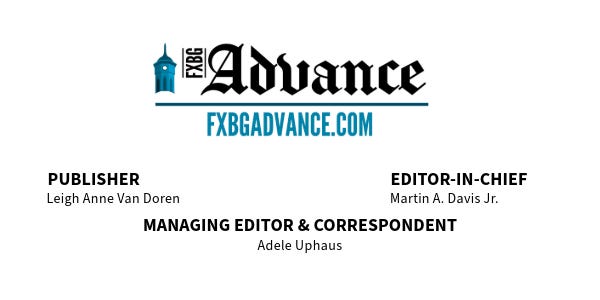OP-ED: My Education in Data-Center Secrecy and Green Illusions
By Eric Bonds
GUEST OPINION WRITER

I have been living in a bubble. Up until recently, I was serving on the City of Fredericksburg’s Clean and Green Commission, working to advance sustainability policy under the illusion that our community was making progress to reach the City Council’s goal of powering our entire town with 100% renewable energy by 2050.
Little did I know that city officials have been working for years to attract energy-intensive data centers. This industry requires enormous amounts of electricity, which means that any such development will make our local commitment to renewable energy meaningless. A single “small” data center can use as much electricity as all the residences in Fredericksburg combined, a need that can only be met by burning more fossil fuels.
Even while serving on a city commission that relates to energy, I had no idea that local leaders had effectively thrown our city climate pledge out the window. Perhaps I shouldn’t feel too bad about my ignorance, local officials weren’t exactly open and forthcoming on the matter.
My bubble officially burst when, thanks to reporting in this paper, I learned last August that the City Council would be voting to use $200,000 of public money to do an electrical utility survey on privately owned land for potential data-center use. It wasn’t described as such on the City Council agenda. Instead, it was listed as a vote on amending the city budget “to support an engineering plan for a power sufficiency study.”
Alarmed that the city’s commitment to renewable energy was at risk, I spoke out and asked other residents to do the same. In response, city leaders asked the local Economic Development Authority to pay for the utility survey instead. With funding secured, the item was withdrawn from the agenda. Council members had found a way to achieve the same goal without having to go on public record with a supportive vote.
Interested in learning about the potential environmental impacts of new data centers in our city, I submitted a Freedom of Information Act (FOIA) request. The response didn’t help enlighten me much in that regard, but it did teach me a little about how long the city has been working to attract data centers and how they are trying to do it.
In one notable example from 2019, officials sent an incentive package to entice a mega-project that would have built multiple data centers in practically all the sizable sections of undeveloped land left in the city. It would have had a carbon footprint tens of times larger than all of Fredericksburg’s combined residents. The package included offers to waive fees and lower taxes, along with potential naming rights to the new minor-league baseball field. Contrary to the idea that governments should treat all people equally, the incentive package also promised to give the data-center developer “concierge-level service,” “priority status,” and “fast-track plan review.”
To the city’s credit, this offer was made just before the City Council passed its commitment to 100% renewable energy. But the climate pledge hasn’t since diminished officials’ desire to bring data centers to Fredericksburg. It is, in fact, listed as a top priority in the City Council’s set of goals for the next three years.
Officials might just get their wish. A company called Penzance recently submitted an application to get approval to build a data center campus. One document I reviewed in the FOIA response suggested that city council members should drive up to Northern Virginia to tour a data center and meet with representatives from the company. The author implied that counselors would need to do so in groups of two, despite the logistical challenges. The unstated reasoning is that if counselors visited with Penzance in groups of three or more, it would trigger open-meeting laws that require prior public announcement and the recording of meeting minutes. This is how officials sometimes work intentionally to keep their activities in the dark.
Ultimately we don’t know if Penzance will get the opportunity to finally build the data-center campus of our city leaders’ dreams. It will require rezoning a currently forested section of land near a residential neighborhood for light industrial use, something that is bound to be contentious.
It also remains uncertain if the data-center industry as a whole, which seems to rely upon secrecy both in Fredericksburg and across the country, can come out of the shadows and openly disclose the climate and environmental impacts of development before it’s approved.
Eric Bonds is a resident of Fredericksburg and a professor of sociology at the University of Mary Washington.
Local Obituaries
To view local obituaries or to send a note to family and loved ones, please visit our website at the link that follows.
Support Award-winning, Locally Focused Journalism
The FXBG Advance cuts through the talking points to deliver both incisive and informative news about the issues, people, and organizations that daily affect your life. And we do it in a multi-partisan format that has no equal in this region. Over the past month, our reporting was:
First to report on a Spotsylvania School teacher arrested for bringing drugs onto campus.
First to report on new facility fees leveled by MWHC on patient bills.
First to detail controversial traffic numbers submitted by Stafford staff on the Buc-ee’s project
Provided extensive coverage of the cellphone bans that are sweeping local school districts.
And so much more, like Clay Jones, Drew Gallagher, Hank Silverberg, and more.
For just $8 a month, you can help support top-flight journalism that puts people over policies.
Your contributions 100% support our journalists.
Help us as we continue to grow!












